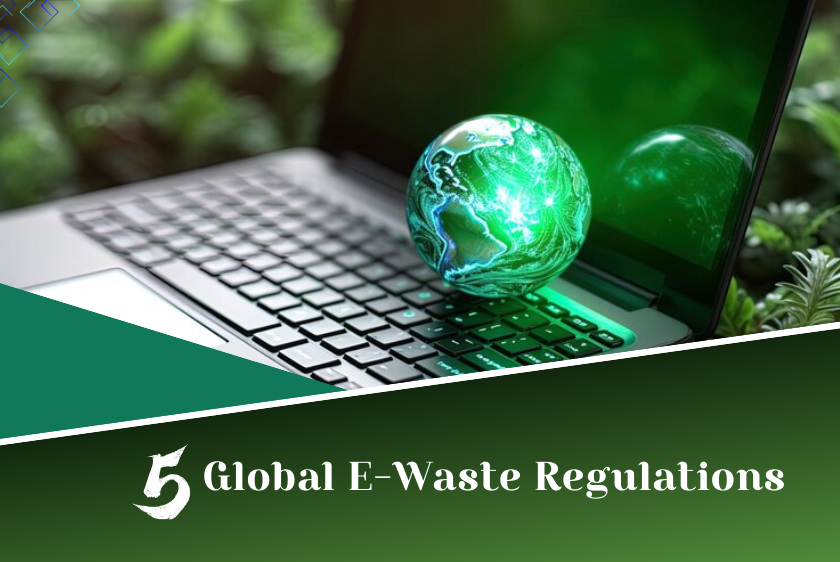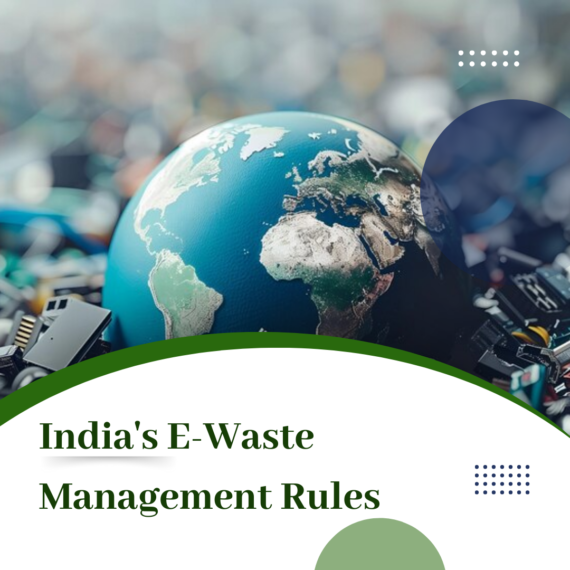
5 Global E-Waste Regulations Every Consumer Should Know
Did you know that the average person generates over 7 kilograms of electronic waste each year? As our reliance on technology grows, so does the amount of discarded gadgets and devices. This e-waste is a significant environmental and health concern. Many countries have implemented regulations to manage and reduce e-waste. Proper disposal protects the environment by preventing hazardous materials like lead and mercury from contaminating soil and water. In this blog, we will discuss the global e-waste regulations that minimize e-waste and protect our environment from toxic components.
Here are five global e-waste regulations every consumer should know-
European Union’s WEEE Directive
The European Union’s Waste Electrical and Electronic Equipment (WEEE) Directive is one of the most comprehensive e-waste regulations worldwide. It aims to reduce the amount of e-waste generated and ensure that producers take responsibility for their product’s end-of-life. The directive mandates that manufacturers must finance the collection, treatment, and recycling of e-waste, ensure proper labeling, and provide information to consumers about safe disposal methods. It helps consumers understand the recycling symbols on their devices and encourages them to return old electronics to designated collection points instead of tossing them in the trash.
United States EPR Laws
In the United States, Extended Producer Responsibility (EPR) laws are enforced at the state level rather than federally. These laws require manufacturers to fund and manage the recycling and disposal of their products. States like California, New York, and Maine have robust EPR programs that cover a wide range of electronic products.
Being aware of your state’s e-waste regulations can help you find local recycling programs and avoid penalties for improper disposal. It also encourages you to support companies that take responsibility for their environmental impact. Moreover, participating in these programs helps reduce the ecological footprint of electronic devices by ensuring that hazardous materials are safely handled and valuable materials are recovered for reuse. It promotes a more sustainable approach to electronics consumption and waste management.
Japan’s Home Appliance Recycling Law
Japan’s Home Appliance Recycling Law focuses on recycling specific types of appliances, including televisions, refrigerators, air conditioners, and washing machines. The law mandates consumers to pay a recycling fee when disposing of these items, which funds the collection and recycling process. If you live in or travel to Japan, understanding this law can save you from unexpected fees and ensure that you dispose of your appliances responsibly. The collected fines are used to support a nationwide recycling infrastructure, including collection centers and advanced recycling facilities. These facilities are capable of efficiently dismantling and processing appliances to recover valuable materials and properly dispose of hazardous substances.
India’s E-Waste Management Rules

India has established stringent e-waste management rules to address the growing e-waste problem. These rules require producers to collect e-waste and ensure it is recycled or disposed of safely. The regulations also promote the establishment of e-waste collection centers and authorized recycling facilities. Knowing these rules helps you identify authorized e-waste collection points and recycling centers in India, contributing to a cleaner environment and supporting sustainable practices.
India’s e-waste management rules also emphasize the importance of increasing consumer awareness about the environmental and health impacts of e-waste. Educational campaigns and initiatives are conducted to inform the public about the proper disposal of electronic devices and the benefits of recycling. By adhering to these rules, consumers play a crucial role in reducing e-waste pollution and promoting a sustainable future.
Australia’s National Television and Computer Recycling Scheme
Australia’s National Television and Computer Recycling Scheme (NTCRS) provides a free service for households and small businesses to recycle their unwanted televisions and computers. The scheme is funded by manufacturers and importers of these products, ensuring that e-waste is managed responsibly.
The NTCRS aims to improve electronic waste recycling rates by providing convenient and accessible recycling options for consumers. Collection events and drop-off points are regularly organized nationwide, making it easy for people to dispose of their old electronics responsibly.
Final Outcome!
Knowing these rules helps you identify authorized e-waste collection points and recycling centers in India, contributing to a cleaner environment and supporting sustainable practices. To make managing your e-waste easier, consider using services like Reecollabb. Reecollabb offers comprehensive e-waste recycling solutions that are both consumer-friendly and environmentally responsible. They provide pick-up services, detailed guidelines on what can be recycled, and ensure that your e-waste is handled according to the prime safety and sustainability standards. By leveraging such services, you contribute significantly to the global effort of reducing electronic waste.
Read Our More Blogs:
Step-by-Step Guide to Sorting Your E-Waste: Best Practices for Homes and Businesses
Future of Wearable Technology and Its Implications for E-Waste
Follow us:







